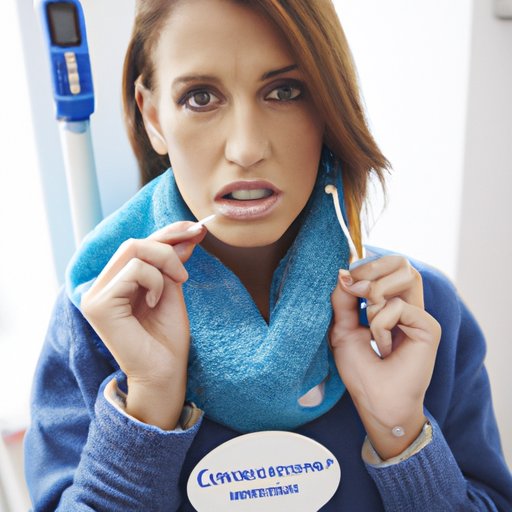
Introduction
Dental health is an essential aspect of our overall well-being. Taking good care of our teeth includes regular visits to the dentist, brushing twice daily, and flossing. But did you know that your lifestyle habits can also impact your dental health? In particular, smoking can lead to numerous dental problems, including discoloration, gum disease, and oral cancer. In this article, we will explore how smoking affects dental health, how dentists detect smoking habits, and how you can quit smoking for better dental health.
The Secrets Your Dentist Knows: How Smoking Affects Dental Health
Smoking is a dangerous habit that can lead to a wide range of health problems, including heart disease, lung cancer, and respiratory disorders. The effects of smoking on dental health are equally alarming. Smoking affects the overall health of your teeth and gums, causing discoloration, tooth decay, gum disease, and tooth loss. The tars and chemicals present in tobacco products can also cause your teeth to appear yellow or brown.
Gum disease is another common dental problem caused by smoking. It occurs when plaque forms on the teeth and gums, leading to inflammation, infection, and eventually tooth loss. Smoking damages the tissue in your gums, making it more difficult for your body to fight off infections. This can lead to gum disease, which is not only painful but also costly to treat.
Finally, smoking can also cause oral cancer. When you smoke, the chemicals in tobacco products can damage the DNA in your cells, leading to mutations that can cause cancer. Oral cancer typically affects the tongue, lips, or throat.
Is Your Dentist Judging You For Smoking? The Answer May Surprise You
Many people worry that their dentist will judge them for smoking and feel embarrassed to admit that they smoke. However, dental professionals follow a strict code of ethics that emphasizes patient confidentiality, respect, and professionalism. Dentists are not here to judge you for your habits but to help you maintain good oral health.
If you smoke, it’s essential to be honest with your dentist about your habits. Your dentist can use this information to provide you with better advice and develop a treatment plan that takes your needs into account. Dentists are trained to provide advice without judgment and can recommend smoking cessation programs to help you quit.
The Telltale Signs: How Dentists Detect Smoking Habits in Patients
During your visit to the dentist, they are trained to look for signs that you are a smoker. Some of the most common signs include yellow or brown stains on the teeth, increased plaque and tartar buildup, and receding gum lines. Dentists may also use specialized tools, such as the Oral Cancer Screening Light, to detect signs of oral cancer.
While dentists are skilled at detecting whether you smoke, it’s always best to be honest about your smoking status. Your dentist can use this information to develop a customized treatment plan that suits your needs and minimizes your risk of developing smoking-related dental health problems.
From Bad Breath to Oral Cancer: The Serious Consequences of Smoking According to Your Dentist
Smoking can have long-term consequences on your dental health, including bad breath, tooth discoloration, and more severe oral health problems. Smoking is a leading cause of periodontal disease, which can cause tooth loss if left untreated. In addition, smoking can also affect dental implants and can make it harder for your body to heal after surgery.
Another severe consequence of smoking is oral cancer. According to the American Cancer Society, oral cancer is twice as prevalent in smokers compared to non-smokers. Smoking can also increase the risk of other types of cancer, including lung and throat cancer.
The Straightforward Truth: Yes, Your Dentist Can Tell If You Smoke – Here’s How
Your dentist can detect whether you smoke by looking for telltale signs in your mouth and teeth. In addition, dentists may ask you questions about your smoking habits during your visit. It is essential to be honest with your dentist, as they can help you quit and provide you with support throughout the process.
If you are looking to quit smoking, your dentist can be a valuable resource. They can recommend smoking cessation programs, nicotine replacement therapy, and other resources to help you quit for good. Quitting smoking can have significant benefits for your dental health, including reducing your risk of oral cancer, periodontal disease, and other smoking-related health problems.
Breaking Myths: Debunking Misconceptions About Smoking and Dental Health
There are many misconceptions surrounding smoking cessation and dental health. One common myth is that smoking can whiten your teeth. While smoking can lead to discoloration, it doesn’t make your teeth whiter. Smoking can also affect dental restorative work, making it more difficult for your teeth to heal after surgery. Smoking can also cause dental implants to fail and may require additional procedures to correct.
If you are looking to quit smoking, there are many successful methods available. Nicotine replacement therapy, counseling, and support groups can all help you quit for good. Additionally, there are many free resources available, including the National Cancer Institute’s smoking cessation website.
Conclusion
Smoking can have severe consequences on your dental health, including discoloration, gum disease, and oral cancer. Your dentist can detect whether you smoke and can provide you with support to help you quit. By being honest about your smoking status and taking steps to quit, you can improve your dental health and reduce your risk of developing smoking-related health problems.
If you smoke, it’s never too late to quit. Consult your dentist or your healthcare professional for advice on how to quit smoking and for support throughout the process.





